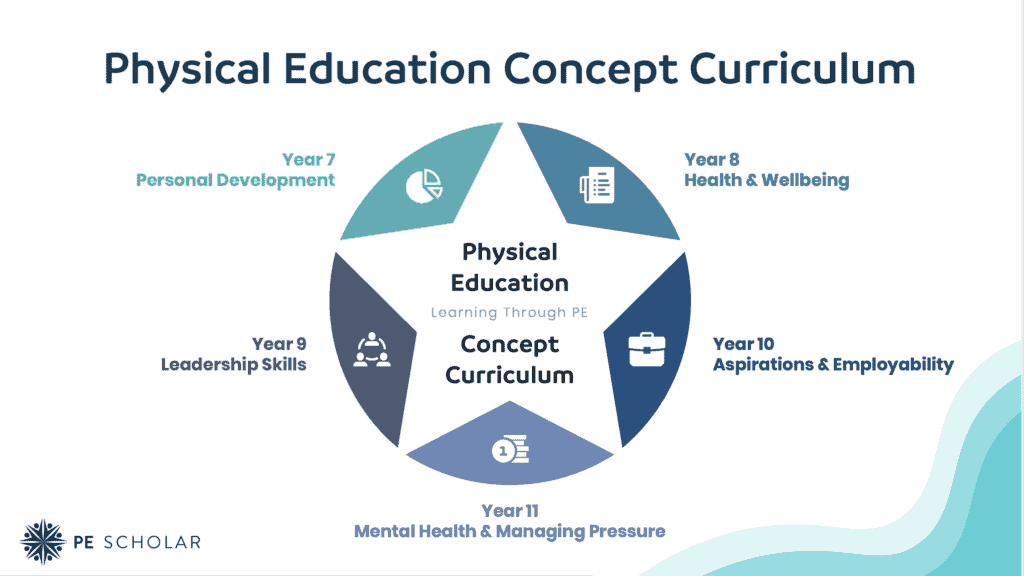
Reimagining Physical Education Curriculum Design – Introducing A Concept-Driven Approach
My sport-driven, skill-focused, performance obsessed PE curriculum was failing to meet the needs of every student. It needed to change.
I raised my feelings in a local Heads of Department (HOD) meeting and two other HODs, Lauren and Craig, got in touch following the meeting to say that they felt the same: bored of the lack of impact being made, same students at extra-curricular, same battles with SLT around time and students being withdrawn, lack of value PE was being given, etc.
So we set about changing it. I had recently been researching Julie Stern’s work around concepts and the transfer of learning. By giving the students key information (acquire) and then applying it to the lesson (connect) we could then reflect on other areas of our past, present or future that this learning could be applied to (transfer). The principles of acquire, connect and transfer made up Sterns’ Transfer Learning Mental Model (Stern, J., et. al., 2021). I had a vision of how this could be applied to PE and shared this with Craig and Lauren.
Imagine a PE lesson in which the main focus is not on the sport-specific skill, but that of a concept, something every student will need in their lives, take resilience for example. We continue to teach our sport-specific lesson but the sport is no longer the destination, it is the vehicle to deliver relevant and meaningful learning. Students will acquire the understanding of the term resilience at the start of the lesson. They will then move into a practical activity, one that would allow them to demonstrate resilience, perhaps the lay-up or jump shot. The teacher can then ask questions to connect this concept to the PE lesson such as: “how did you demonstrate resilience in that last task?” or “how might the concept of resilience enable you to make progress in this lesson?”. Students will make stronger connections to the concept and the PE lesson they are in. Finally, after further practical activities we come to the transfer phase where self-reflective questions can be posed including: “How can you apply resilience to support you in another class?”, or “How can your understanding of this concept enable you to succeed in the future?”. Teachers should reward attitude and progress over performance and ability. The students are still developing their skills and techniques in sport, but are no-longer judged by it. They are receiving learning that will genuinely prepare them for life, in a positive and meaningful PE environment that can better nurture physical literacy.
With this vision, Lauren, Craig and I spent hours debating, researching writing and re-writing schemes of work and lesson plans that we knew could change the way our subject is engaged with and valued. Thus the concept-driven curriculum was born. To view the complete concept-driven curriculum please click here.
Ask yourself…
PE is in a unique position in that it is able to directly influence the health and well-being of an individual for the rest of their lives. As a physical educator you should ask yourself the following questions:
- Is PE valued in your school?
- Does PE meet the needs of every student?
- Does your curriculum nurture physical literacy?
- Does your current offering meet your ‘why’?
Time for change
If the answer to any of the questions above is no, then it’s time to change.
About the author
Lee Sullivan – @Lee_Sullivan85
Head of Physical Education
Upton Court Grammar School
Preparing students for life through physical education is Lee’s ‘why’ and this value was the main motivation for creating this concept-driven curriculum. Currently a Head of Department and formerly a pastoral Leader, Lee grew frustrated with a PE curriculum focused on sport and performance. Lee realised that a curriculum obsessed with sporting ability was not only failing to meet the needs of most students, it was putting them off physical activity altogether. He knew PE had the power to be so much more. By shifting the learning in a PE lesson to focus on concepts rather than sport specific skills, Lee has created a positive and meaningful PE environment that better nurtures physical literacy and develops positive attitudes towards physical activity.


[…] different approaches, all with intent to flourish the next generation of students. Lee Sullivan’s Concept Curriculum moves away from technique and performance, Greg Dryer’s Mi Move is providing key data and insight […]